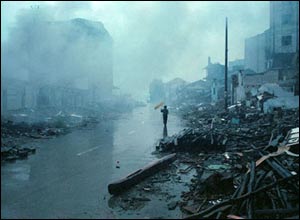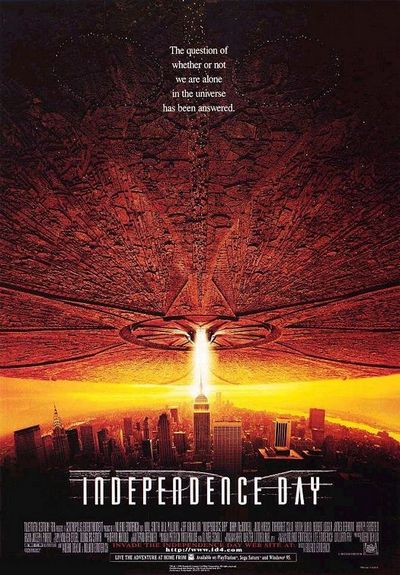January 18, 2007
After the end, again

The discussion of post-apocalypse culture continues, with contributions from Jodi . Owen , Larval Subjects and Rough Theory.
Jodi is sceptical about my claim that apocalyptic dread has receded from the popular unconscious. This may well be a difference between the UK and the US, although, as far as I am concerned, none of the examples Jodi provides convincingly make the case: as Jodi herself concedes, Apocalypto is not about apocalypse in the relevant sense, while the forthcoming Omega Man is itself a remake of a film from an earlier - in my view much more genuinely apocalypse-fixated - era. (Interestingly, incidentally, The Omega Man was already a remake of the 1964 The Last Man on Earth, starring Vincent Price.) That leaves Children of Men, which may well be apocalyptic - but, well, one radioactive swallow does not a nuclear winter make. Jodi is right that there is no British equivalent to the religious apocalypticism that features so prominently in American cultural life but this is less apocalyptic dread than apocalyptic ecstasy, a fevered anticipation of the Rapture.
The kind of apocalyptic dread I am referring to was in any case far too pervasive to be reduced to particular cultural artefacts; nor was it confined to religious groups. There were, of course, innumerable films, novels and songs which explicitly dealt with apocalypse of one kind or another, but the dread was so widespread, so deep-rooted, that it amounted to a psychic climate. The whole of postpunk was an expression of this climate, which in part accounts for the appeal to postpunk of Ballard, whose Atrocity Exhibition remains the best primer on Cold War psychopathology. Jeff Nuttall's indispensable Bomb Culture went so far as to claim that the impulse behind postwar popular culture in its entirety was the virtual presence of nuclear war.
During the 60s, 70s and 80s, dreams about nuclear annihilation were such a nightly routine that they were deemed unworthy of comment. I remember a period of a few years as a child when I would ritualistically watch the first few minutes of the news just to check that a nuclear war was not imminent. Such dread was not confined to the anxious or the neurotic; it was part of the background noise of the culture. It may well be the case that this type of dread remains a feature of everyday life in the USA; I think I can say with some confidence that it no longer is the case here. In fact, if you describe the level of fear that was taken for granted in the Cold War to British teenagers, they are likely to look at you askance.
Certainly, Sinthome's remarks - in particular, his claim that 'apocalyptic fantasies' are 'omnipresent' in American culture - suggest that apocalypse has retained its hold on the American unconscious. The key passage in Sinthome's post is the following, where, in an echo of similar claims by Fredric Jameson, he makes the case that apocalyptic fantasies mask disavowed utopian impulses:
- [C]ould not the omnipresence of apocalyptic fantasies in American culture be read as an indication that somehow we have "given way on our desire" or betrayed our desire at a fundamental social level? That is, these visions simultaneously allow us to satisfy our aggressive animosity towards existing social relations, while imagining an alternative (inevitably we always triumph in these scenerios, even if reduced to fundamentally primative living conditions... a fantasy in itself), while also not directly acknowledging our discontent with the conditions of capital (it is almost always some outside that destroys the system, not direct militant engagement).
Against, or perhaps alongside, Sinthome's 'hope that apocalyptic fantasies manifest a desire for something other than their explicit content', N Pepperell at Rough Theory suggests that 'we can understand Adorno’s work as an attempt to reflect seriously ... on the possibility that certain mass movements might genuinely desire to achieve what their fantasies express: destruction and death.' A complementary analysis might emphasise the fantasy of survivability, as Christopher Lasch did in The Minimal Self: Pyschic Survival in Troubled Times, a book which seems in many respects to be a relic of the final phase of the Cold War. Lasch's claim was that, in the face of neo-liberal economic 'reform' and multiple threats of catastrophe - ecological, military - the self had been stripped down into a protective core. Anything beyond brute survival had become an extravagance. This 'minimal self' makes it beyond the Cold War to the end of history, and I wonder if the popular cultural examples Sinthome gives aren't better read as survivalist, rather than apocalyptic, fantasies: Independence Day and Armageddon, for instance, strike me as quintessentially nineties films in which the emphasis is not upon the apocalypse but on the very quick restitution of 'ordinary' life. In both, the destruction by Special Effects of a few cities is speedily succeeded by the muscular and heroic defence of the soon resumed American way of life, a fantasy which ominously foreshadowed the Shock and Awe response to 9/11.
Posted by mark at January 18, 2007 06:59 PM | TrackBack